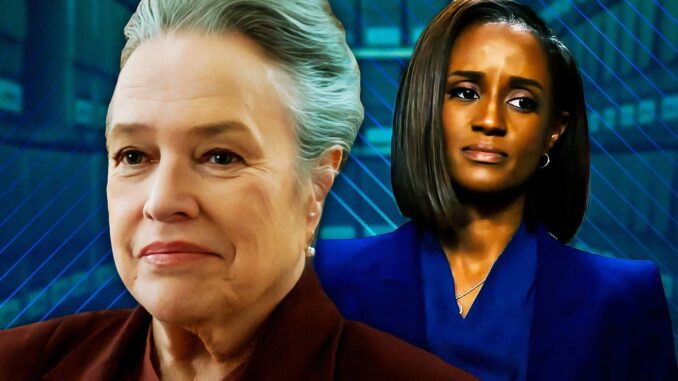
The Gavel’s Echo: Kathy Bates and Matlock’s Dramatic Revival Where Law, Politics, and Emotions Intersect
The sharp rap of a gavel, the hushed anticipation of a jury, the impassioned plea of a defense attorney – these are the enduring hallmarks of courtroom drama, a genre that has captivated audiences for decades. From the folksy wisdom of Andy Griffith’s Ben Matlock to the intricate machinations of modern legal thrillers, the pursuit of justice, however elusive, remains a potent narrative force. But imagine a “dramatic revival” of Matlock, not as a nostalgic retread, but as a searing, contemporary exploration of law, politics, and emotion, spearheaded by an actor of unparalleled gravitas and grit: Kathy Bates. This isn’t merely a casting fantasy; it’s an invitation to dissect the very sinews of justice in a polarized world, using Bates as our guide through the complex intersections where the scales of law are often weighed down by the invisible forces of power and human feeling.
Kathy Bates, with her formidable intelligence, world-weary compassion, and capacity for both ferocious intensity and subtle vulnerability, is the ideal figure to anchor such a reimagining. Gone would be the gentle, Southern charm of the original Matlock, replaced by a character imbued with Bates’s signature blend of no-nonsense integrity and a barely-contained fire. Let us envision her as Eleanor Vance, a seasoned defense attorney in a city scarred by inequity. Vance, like Matlock, possesses an uncanny ability to peel back layers of deception, to see the quiet truth hidden beneath grandstanding and perjured testimony. But her methods would be less folksy, more surgically precise, her victories often hard-won and morally ambiguous. Bates’s presence would immediately elevate the material, ensuring that every legal maneuver is imbued with the personal stakes and ethical dilemmas that define her best work. She doesn’t just play characters; she inhabits their very bones, allowing audiences to feel the crushing weight of their burdens and the fierce joy of their small triumphs.
In this dramatic revival, the “law” would cease to be a pristine, impartial edifice and instead become a battleground reflecting the complexities of contemporary society. Cases wouldn’t merely be “whodunits” but deeply entrenched social commentaries. Eleanor Vance would confront corporate behemoths facing environmental charges, their legal teams armed with unlimited resources, their crimes often shielded by political influence. She would defend whistleblowers silenced by powerful lobbies, their acts of conscience framed as betrayal. She would navigate the labyrinthine nuances of civil rights battles, where legal precedents clash with lived experience, and justice for one often means challenging an entrenched system for many. The courtroom, under Bates’s watchful eye, would transform into a microcosm of broader societal struggles, where the letter of the law is constantly being tested against its spirit, revealing its inherent biases and its potential for both profound good and systemic harm.
This brings us to the inescapable shadow of “politics.” In a Matlock revival featuring Kathy Bates, politics would not be a tangential subplot but an inextricable force woven into the fabric of every case. From the public defender’s office fighting for adequate resources against budget cuts, to politically motivated charges designed to silence dissent, to the influence of campaign donations on judicial appointments – every legal skirmish would carry a political undertone. Vance might find herself defending activists accused of disruptive protests, their actions lawful but deemed inconvenient by the establishment. She might expose systemic corruption reaching into the highest levels of municipal government, where laws are bent and twisted to serve powerful interests. The show would illustrate how public opinion, swayed by polarized media landscapes and social media storms, can taint a jury pool, making the pursuit of objective truth a Herculean task. Politics, in this world, is not just about elections; it’s about power, control, and the manipulation of narratives that often dictate who gets justice and who does not.
Finally, and perhaps most powerfully, “emotions” would be the fuel that drives this dramatic engine. Bates’s portrayal of Eleanor Vance would be a masterclass in controlled passion. We would witness the palpable fear of her clients, the seething anger of victims seeking redress, the fragile hope of those caught in the legal grinder. Vance herself would be a repository of these emotions, absorbing the despair and channeling it into a fierce, unwavering determination. The series would explore how emotions – empathy, rage, compassion, prejudice – play out in the courtroom: how a charismatic prosecutor can sway a jury with a compelling narrative, regardless of facts; how a defense attorney must not only present evidence but also appeal to the jury’s shared humanity; how the personal biases of a judge can subtly influence proceedings. For Bates’s Vance, the law isn’t just logic; it’s a deeply human endeavor, messy and unpredictable, where the heart often battles the head, and the desire for vengeance can eclipse the pursuit of true justice.
A Matlock revival starring Kathy Bates, therefore, would be far more than a simple legal procedural. It would be an illustrative essay on screen, examining how the seemingly clear lines of “law” blur and distort under the pressures of “politics” and the raw, undeniable force of human “emotions.” It would challenge viewers to confront uncomfortable truths about our justice system, inviting them to question who truly benefits from its structures and who is left behind. With Bates at the helm, commanding the screen with her unparalleled ability to convey both grit and grace, such a series would not just revive a beloved format; it would profoundly redefine it, offering a compelling and necessary reflection of our tumultuous times. The gavel’s echo, in her hands, would ring with a new, potent resonance, demanding not just attention, but introspection.
